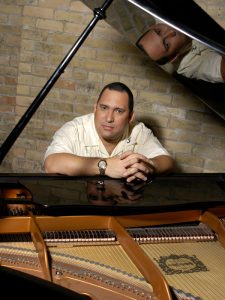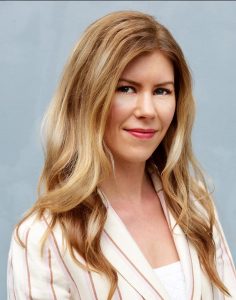THE ROARING TWENTIES AND FLYING FINGERS
By GARY DEMUTH

Fast flying fingers are a hallmark of Afro-Cuban jazz pianist Ignacio “Nachito” Herrera’s unique style, which will be on dazzling display during his upcoming performance of a 1920s George Gershwin classic.
Gershwin’s symphonic masterpiece, “Rhapsody in Blue,” a sweetly sonic melding of classical and jazz styles, will be performed by the acclaimed Grammy-winning musician during the opening concert of the Salina Symphony’s 2023-24 season.
Concertgoers who witness Herrera’s unique interpretation of the nearly 100-year-old American classic will be in for a special treat, said Yaniv Segal, music director and conductor of the Salina Symphony.
“Nachito started as a classical pianist, then transitioned into an African-Cuban jazz pianist,” Segal said. “He mostly stays true to the composer’s intent but sometimes his incredible sense of rhythm comes through, and he brings his unique style to it. I’ve never seen someone’s hands move so fast on a keyboard.”
Guest artist Herrera’s performance of “Rhapsody in Blue” will be the centerpiece of “The Roaring Twenties,” a concert infused with the sounds and spirit of the Jazz Age of the 1920s. The concert will begin at 4 p.m. Oct. 1 at the Stiefel Theatre for the Performing Arts, 151 S. Santa Fe.
The Salina Symphony will open the concert with contemporary composer Audrey Kelley’s “Speakeasy: Four Vignettes of the Roaring Twenties,” followed by a performance of Jean Sibelius’s sweeping one-movement Seventh Symphony.
The second half of the concert will feature Herrera, who will not only showcase his unique take on “Rhapsody in Blue,” but will follow with several original compositions that meld classical and Latin rhythms.
“This is a really exciting concert to do,” Segal said. “It’s creating a balance between a symphony orchestra and a jazz band.”
Award winning pianist
Two-time Grammy award winner Herrera has performed in many of the world’s most famous concert halls and at prestigious jazz festivals. As a piano soloist with orchestra, he has appeared with the National Symphony Orchestra of Cuba, the Minnesota Orchestra and the Naples Philharmonic Orchestra, among many others.
As a pianist, music director, composer, arranger, producer and recording artist, Herrera has worked with such renowned groups as the Buena Vista Social Club (which he first was invited to join at age 16), Cubanismo and the Afro-Cuban All Stars.
A website devoted to jazz music, All About Jazz, has described Herrera as having “stepped onto the national stage as a fully evolved artist, brimming with confidence, in total command of vast array of traditional and contemporary Cuban idioms, and imparting a virtuosic touch on all aspects of (this) shimmering production.”
Segal said that as great as Herrera’s performance of “Rhapsody in Blue” is certain to be, Herrera’s original pieces are just as compelling, blending classical with Cuban and Latin-flavored jazz rhythms.
“He turns Chopin into Latin dance numbers,” Segal said. “It’s awesome.”
Contemporary composition
 When Segal selected “Rhapsody in Blue,” written in 1924, as the centerpiece for the “Roaring Twenties” concert, he looked for an accompanying contemporary piece that focused on the 1920s.
When Segal selected “Rhapsody in Blue,” written in 1924, as the centerpiece for the “Roaring Twenties” concert, he looked for an accompanying contemporary piece that focused on the 1920s.
He found what he was looking for with composer Audrey Kelley’s “Speakeasy: Four Vignettes of the Roaring Twenties,” a piece that comments on the social upheavals of that tumultuous period in American history.
“Inspired by the anniversary of the women’s suffrage movement of 1920, Audrey wrote four different scenes from the Roaring Twenties,” Segal said. “(At one point), she uses an old Victrola phonograph and plays old records on it. It’s a lighthearted, beautiful and fun piece. It pairs well with the Gershwin.”
Segal also chose a classical composition from the 1920s: Sebelius’s Seventh Symphony, written in 1924, which is unique among classical symphonies in that it was written in just one movement, running about 18 minutes, which is short for a full-length symphony, Segal said.
“(Sebelius) accomplished what he wanted to say in just one movement,” he said. “It’s interesting that he never wrote another symphony after that one. He suffered from anxiety and was an alcoholic. He never finished that eighth symphony. What he did write, he threw in the fireplace.”
Tickets on sale
Tickets for the Salina Symphony’s “Roaring Twenties” concert are $35 and $42 for adults or $25 for students. Tickets may be purchased at the Stiefel Theatre box office, by calling 785-827-1998 or online at www.salinasymphony.org.
Segal and composer Audrey Kelley will present a pre-concert talk at 3 p.m. Oct. 1 in the Stiefel Theatre’s Watson Room. Those attending are asked to enter through the main theatre doors, which will be opened at 2:30 p.m.
Season tickets are still available to order by phone at 785-823-8309 or in person at the Salina Symphony office, located on the second floor of the Stiefel Theatre.
For more information, contact Salina Symphony executive director Adrienne Allen at 823-8309 or visit www.salinasymphony.org.
